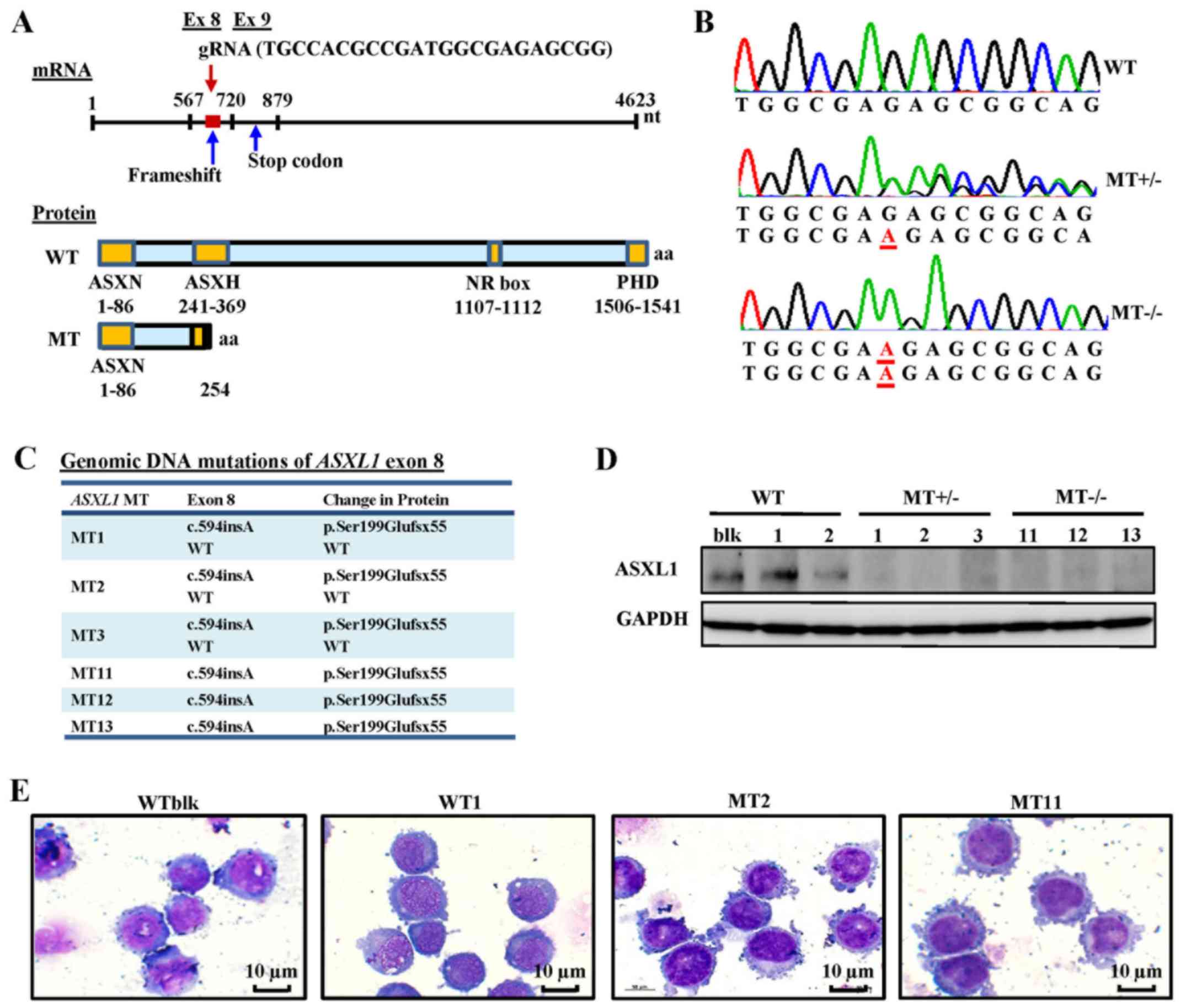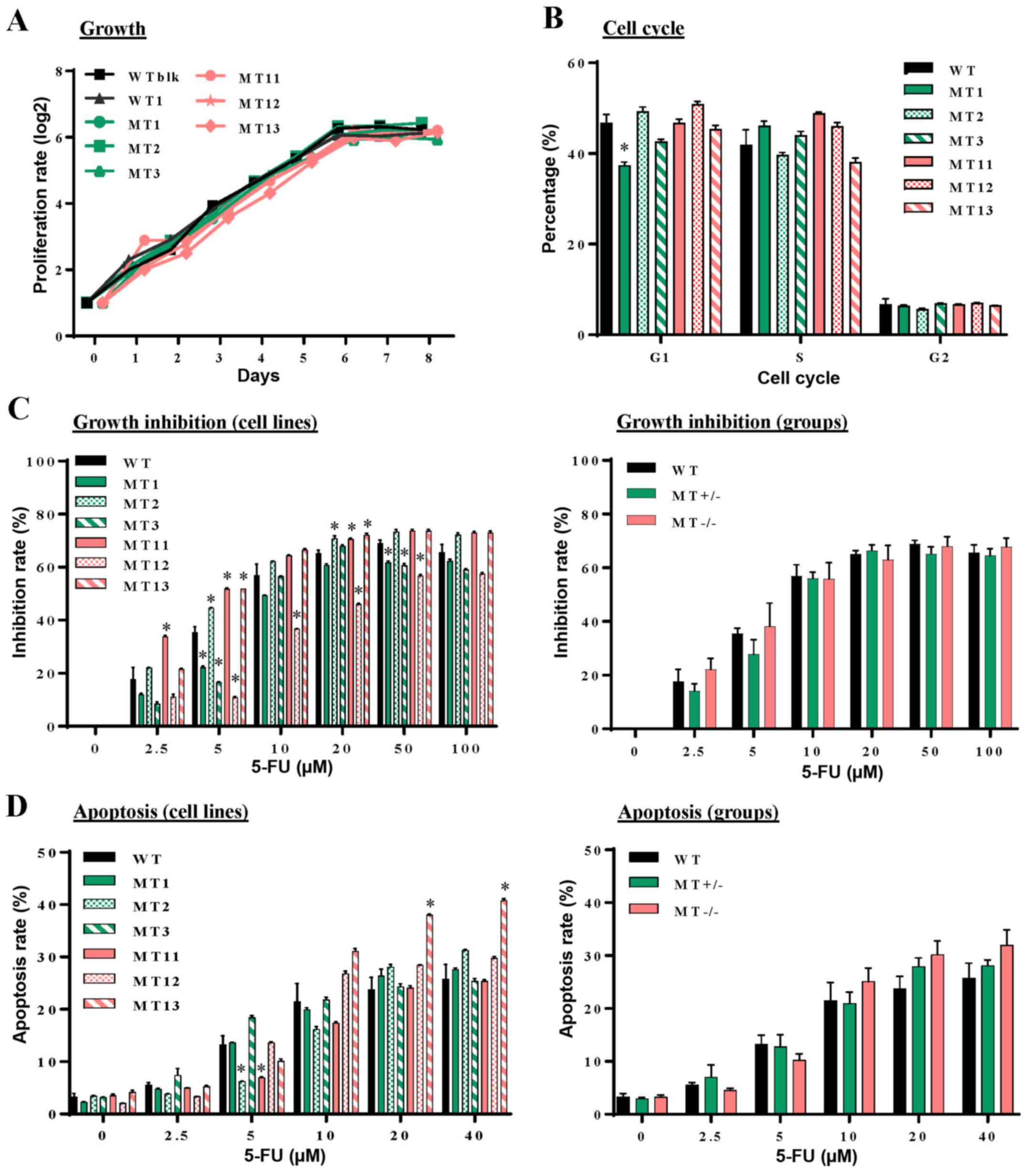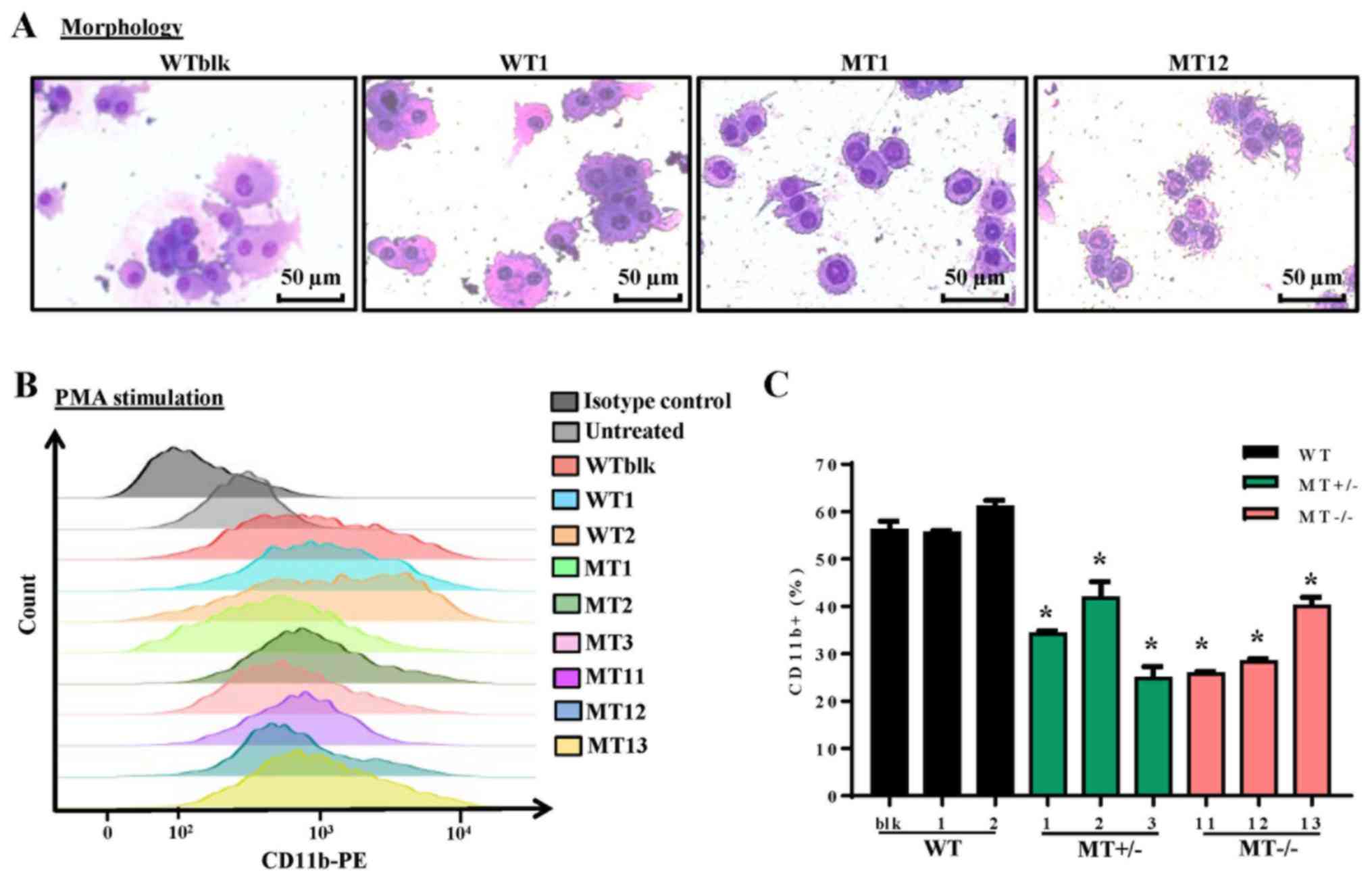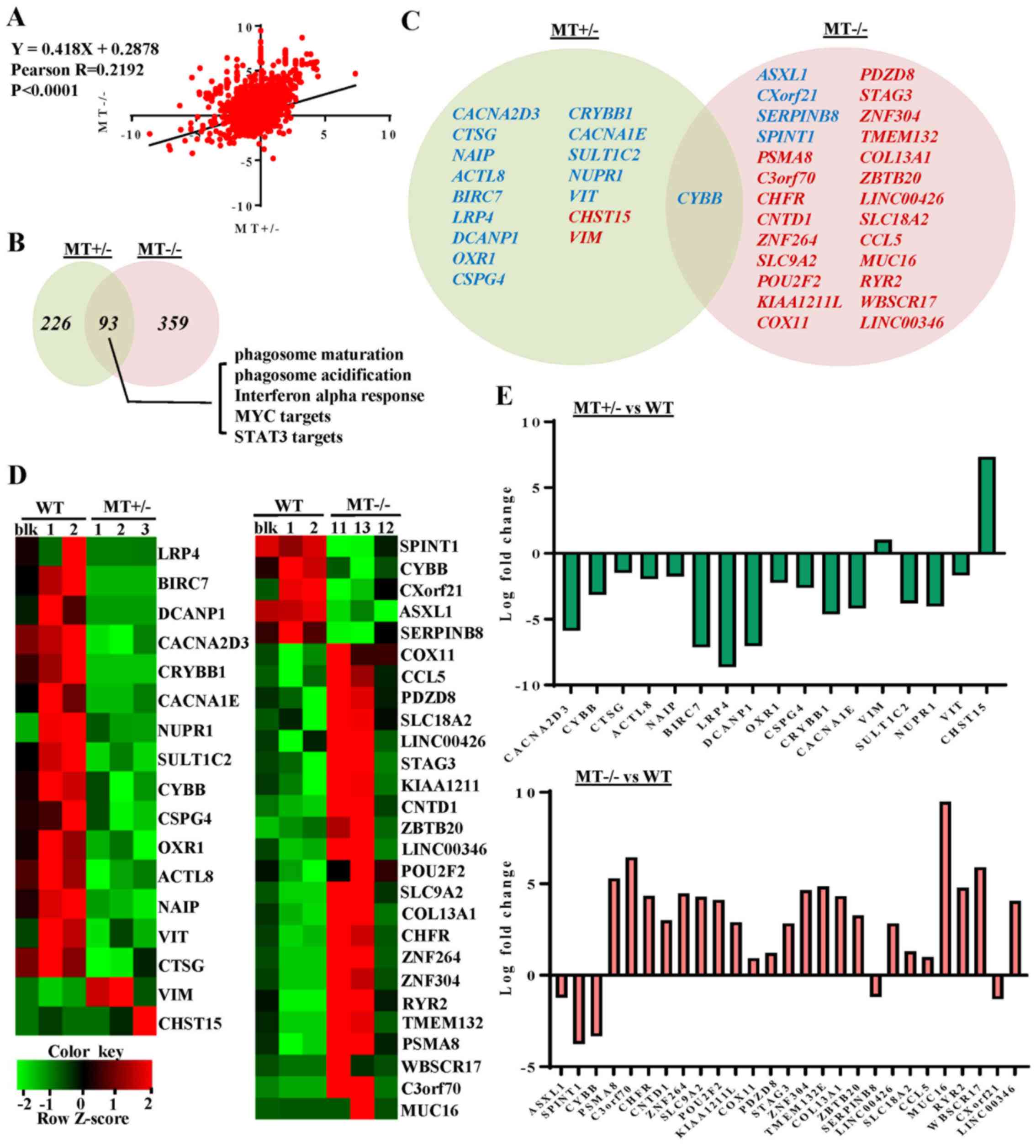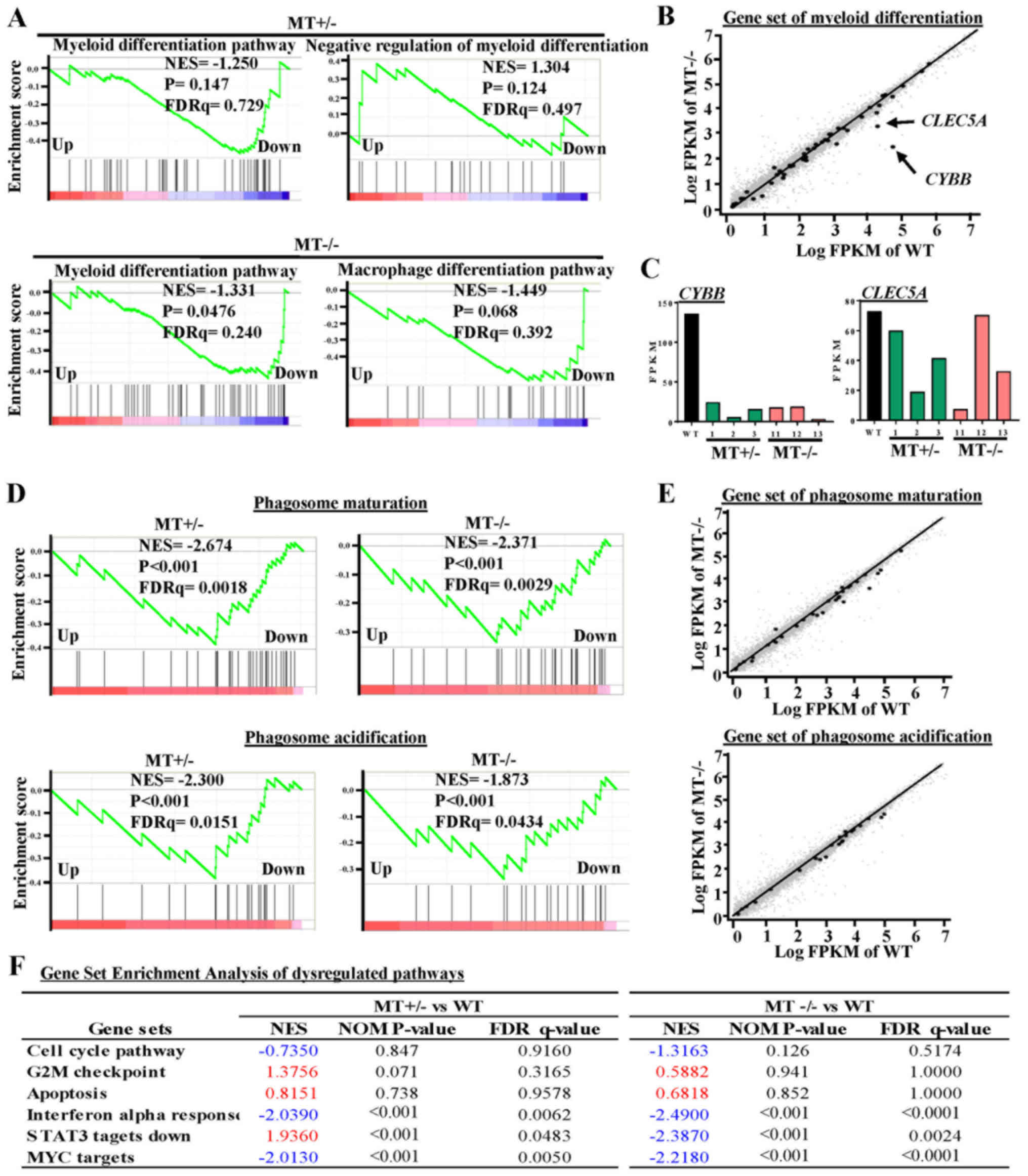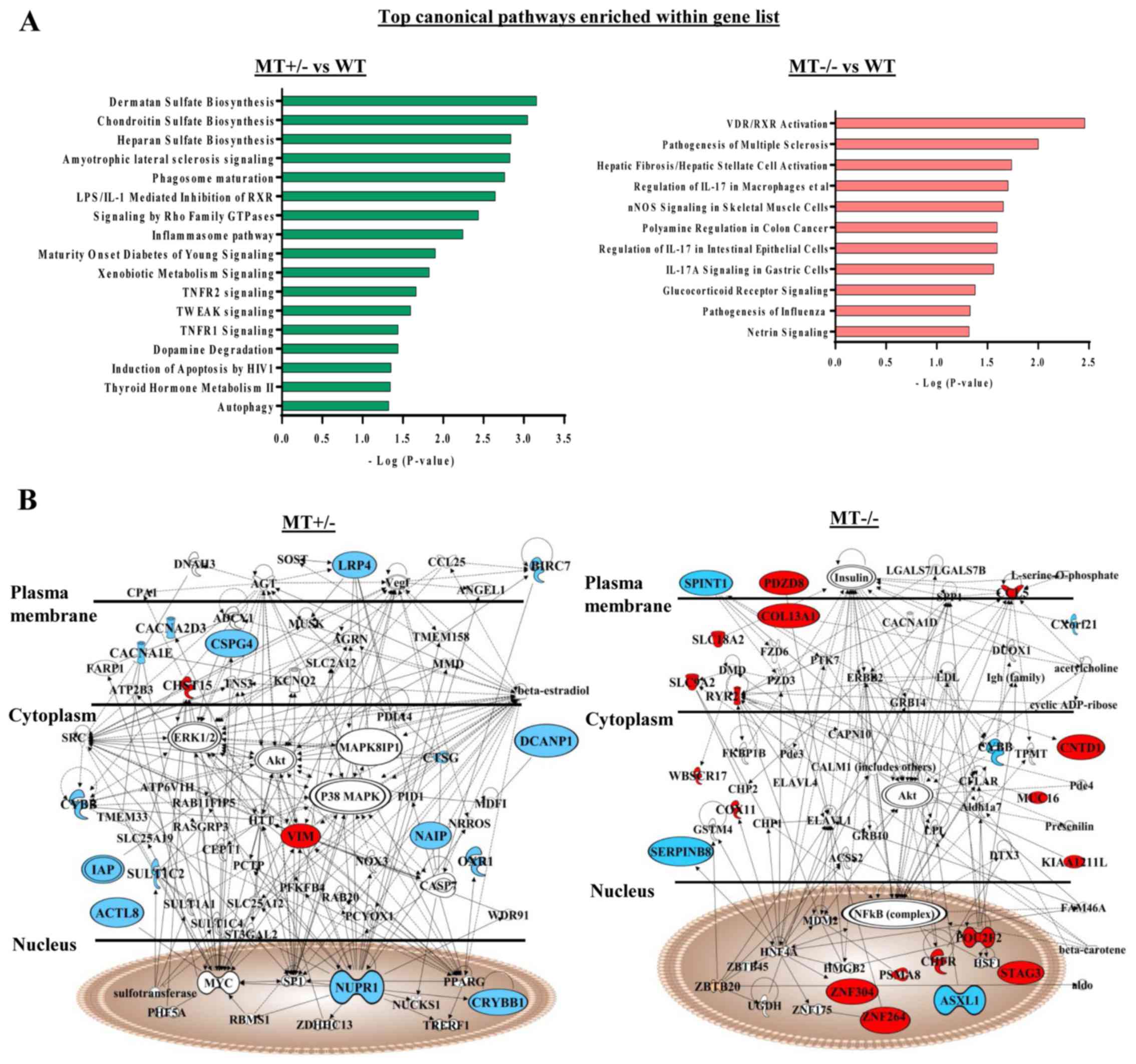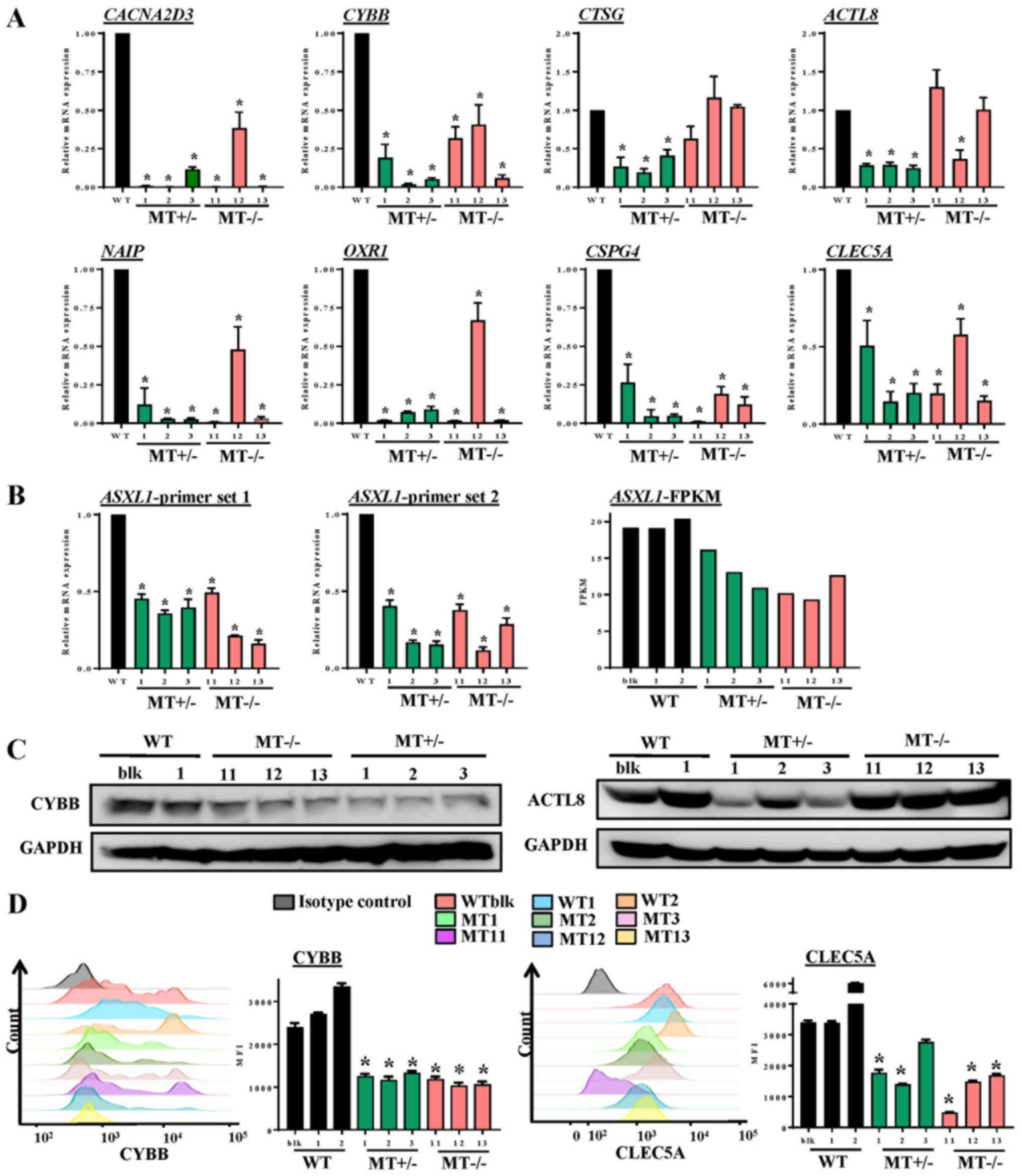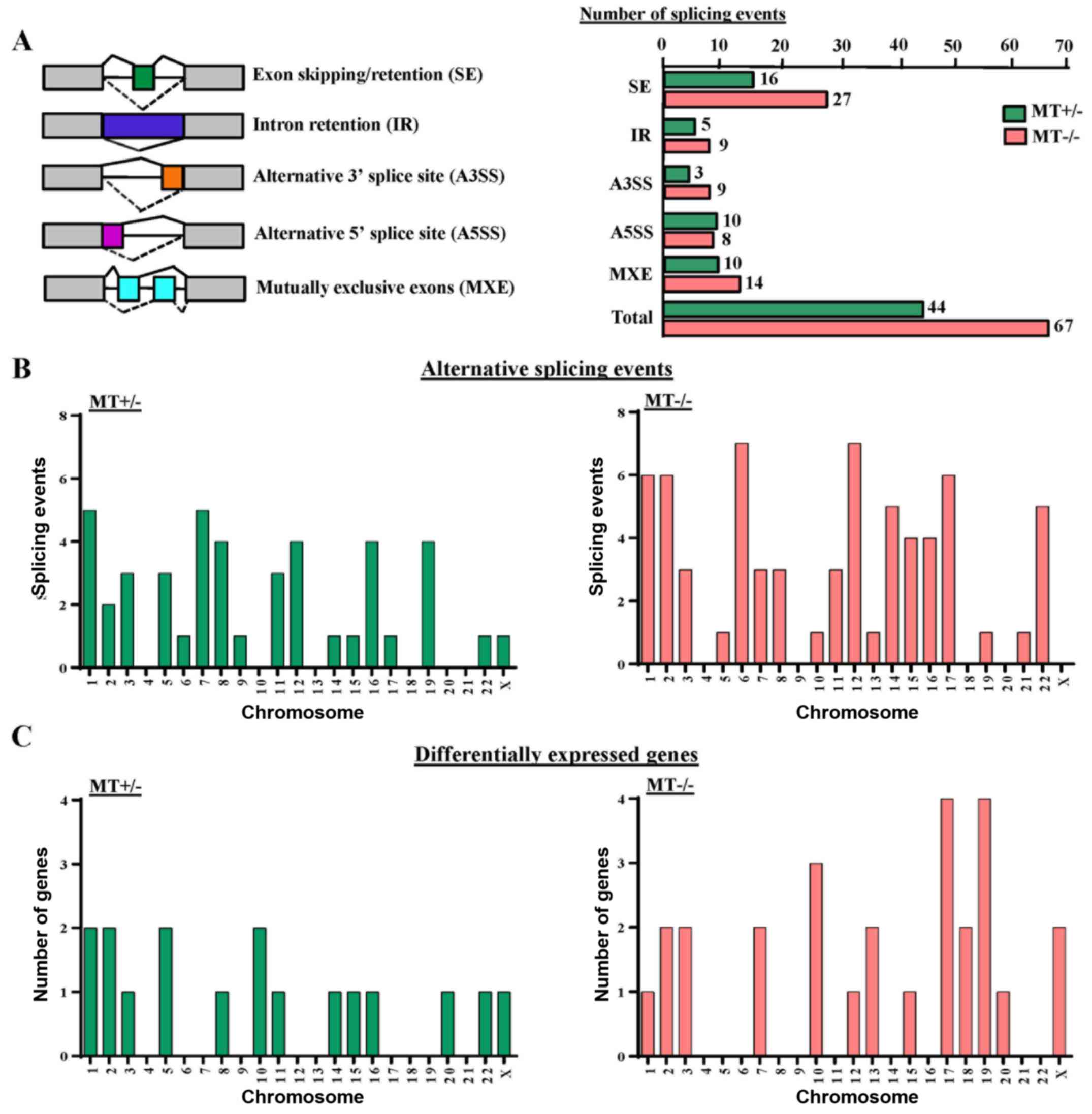|
1
|
Rocquain J, Carbuccia N, Trouplin V,
Raynaud S, Murati A, Nezri M, Tadrist Z, Olschwang S, Vey N,
Birnbaum D, et al: Combined mutations of ASXL1, CBL, FLT3, IDH1,
IDH2, JAK2, KRAS, NPM1, NRAS, RUNX1, TET2 and WT1 genes in
myelodysplastic syndromes and acute myeloid leukemias. BMC Cancer.
10:4012010. View Article : Google Scholar : PubMed/NCBI
|
|
2
|
Gelsi-Boyer V, Trouplin V, Adélaïde J,
Bonansea J, Cervera N, Carbuccia N, Lagarde A, Prebet T, Nezri M,
Sainty D, et al: Mutations of polycomb-associated gene ASXL1 in
myelodysplastic syndromes and chronic myelomonocytic leukaemia. Br
J Haematol. 145:788–800. 2009. View Article : Google Scholar : PubMed/NCBI
|
|
3
|
Boultwood J, Perry J, Pellagatti A,
Fernandez-Mercado M, Fernandez-Santamaria C, Calasanz MJ, Larrayoz
MJ, Garcia-Delgado M, Giagounidis A, Malcovati L, et al: Frequent
mutation of the polycomb-associated gene ASXL1 in the
myelodysplastic syndromes and in acute myeloid leukemia. Leukemia.
24:1062–1065. 2010. View Article : Google Scholar : PubMed/NCBI
|
|
4
|
Thol F, Friesen I, Damm F, Yun H,
Weissinger EM, Krauter J, Wagner K, Chaturvedi A, Sharma A,
Wichmann M, et al: Prognostic significance of ASXL1 mutations in
patients with myelodysplastic syndromes. J Clin Oncol.
29:2499–2506. 2011. View Article : Google Scholar : PubMed/NCBI
|
|
5
|
Gelsi-Boyer V, Trouplin V, Roquain J,
Adélaïde J, Carbuccia N, Esterni B, Finetti P, Murati A, Arnoulet
C, Zerazhi H, et al: ASXL1 mutation is associated with poor
prognosis and acute transformation in chronic myelomonocytic
leukaemia. Br J Haematol. 151:365–375. 2010. View Article : Google Scholar : PubMed/NCBI
|
|
6
|
Inoue D, Kitaura J, Matsui H, Hou HA, Chou
WC, Nagamachi A, Kawabata KC, Togami K, Nagase R, Horikawa S, et
al: SETBP1 mutations drive leukemic transformation in ASXL1-mutated
MDS. Leukemia. 29:847–857. 2015. View Article : Google Scholar :
|
|
7
|
Schnittger S, Eder C, Jeromin S, Alpermann
T, Fasan A, Grossmann V, Kohlmann A, Illig T, Klopp N, Wichmann HE,
et al: ASXL1 exon 12 mutations are frequent in AML with
intermediate risk karyotype and are independently associated with
an adverse outcome. Leukemia. 27:82–91. 2013. View Article : Google Scholar
|
|
8
|
Zong X, Yao H, Wen L, Ma L, Wang Q, Yang
Z, Zhang T, Chen S and Depei W: ASXL1 mutations are frequent in de
novo AML with trisomy 8 and confer an unfavorable prognosis. Leuk
Lymphoma. 58:204–206. 2017. View Article : Google Scholar
|
|
9
|
Alpermann T, Haferlach C, Eder C,
Nadarajah N, Meggendorfer M, Kern W, Haferlach T and Schnittger S:
AML with gain of chromosome 8 as the sole chromosomal abnormality
(+8 sole) is associated with a specific molecular mutation pattern
including ASXL1 mutations in 46.8% of the patients. Leuk Res.
39:265–272. 2015. View Article : Google Scholar : PubMed/NCBI
|
|
10
|
Yoshizato T, Dumitriu B, Hosokawa K,
Makishima H, Yoshida K, Townsley D, Sato-Otsubo A, Sato Y, Liu D,
Suzuki H, et al: Somatic Mutations and Clonal Hematopoiesis in
Aplastic Anemia. N Engl J Med. 373:35–47. 2015. View Article : Google Scholar : PubMed/NCBI
|
|
11
|
Fisher CL, Lee I, Bloyer S, Bozza S,
Chevalier J, Dahl A, Bodner C, Helgason CD, Hess JL, Humphries RK,
et al: Additional sex combs-like 1 belongs to the enhancer of
trithorax and polycomb group and genetically interacts with Cbx2 in
mice. Dev Biol. 337:9–15. 2010. View Article : Google Scholar :
|
|
12
|
Park UH, Yoon SK, Park T, Kim EJ and Um
SJ: Additional sex comb-like (ASXL) proteins 1 and 2 play opposite
roles in adipogenesis via reciprocal regulation of peroxisome
proliferator-activated receptor {gamma}. J Biol Chem.
286:1354–1363. 2011. View Article : Google Scholar
|
|
13
|
Cho YS, Kim EJ, Park UH, Sin HS and Um SJ:
Additional sex comb-like 1 (ASXL1), in cooperation with SRC-1, acts
as a ligand-dependent coactivator for retinoic acid receptor. J
Biol Chem. 281:17588–17598. 2006. View Article : Google Scholar : PubMed/NCBI
|
|
14
|
Katoh M: Functional and cancer genomics of
ASXL family members. Br J Cancer. 109:299–306. 2013. View Article : Google Scholar : PubMed/NCBI
|
|
15
|
Scheuermann JC, de Ayala Alonso AG, Oktaba
K, Ly-Hartig N, McGinty RK, Fraterman S, Wilm M, Muir TW and Müller
J: Histone H2A deubiquitinase activity of the Polycomb repressive
complex PR-DUB. Nature. 465:243–247. 2010. View Article : Google Scholar : PubMed/NCBI
|
|
16
|
Abdel-Wahab O, Gao J, Adli M, Dey A,
Trimarchi T, Chung YR, Kuscu C, Hricik T, Ndiaye-Lobry D, LaFave
LM, et al: Deletion of Asxl1 results in myelodysplasia and severe
developmental defects in vivo. J Exp Med. 210:2641–2659. 2013.
View Article : Google Scholar : PubMed/NCBI
|
|
17
|
Inoue D, Kitaura J, Togami K, Nishimura K,
Enomoto Y, Uchida T, Kagiyama Y, Kawabata KC, Nakahara F, Izawa K,
et al: Myelodysplastic syndromes are induced by histone
methylation-altering ASXL1 mutations. J Clin Invest. 123:4627–4640.
2013. View Article : Google Scholar : PubMed/NCBI
|
|
18
|
Wang J, Li Z, He Y, Pan F, Chen S, Rhodes
S, Nguyen L, Yuan J, Jiang L, Yang X, et al: Loss of Asxl1 leads to
myelodysplastic syndrome-like disease in mice. Blood. 123:541–553.
2014. View Article : Google Scholar :
|
|
19
|
Carbuccia N, Murati A, Trouplin V,
Brecqueville M, Adélaïde J, Rey J, Vainchenker W, Bernard OA,
Chaffanet M, Vey N, et al: Mutations of ASXL1 gene in
myeloproliferative neoplasms. Leukemia. 23:2183–2186. 2009.
View Article : Google Scholar : PubMed/NCBI
|
|
20
|
Carbuccia N, Trouplin V, Gelsi-Boyer V,
Murati A, Rocquain J, Adélaïde J, Olschwang S, Xerri L, Vey N,
Chaffanet M, et al: Mutual exclusion of ASXL1 and NPM1 mutations in
a series of acute myeloid leukemias. Leukemia. 24:469–473. 2010.
View Article : Google Scholar
|
|
21
|
Abdel-Wahab O, Adli M, LaFave LM, Gao J,
Hricik T, Shih AH, Pandey S, Patel JP, Chung YR, Koche R, et al:
ASXL1 mutations promote myeloid transformation through loss of
PRC2-mediated gene repression. Cancer Cell. 22:180–193. 2012.
View Article : Google Scholar : PubMed/NCBI
|
|
22
|
Hilgendorf S, Folkerts H, Schuringa JJ and
Vellenga E: Loss of ASXL1 triggers an apoptotic response in human
hematopoietic stem and progenitor cells. Exp Hematol.
44:1188–1196.e6. 2016. View Article : Google Scholar : PubMed/NCBI
|
|
23
|
Banaszak LG, Giudice V, Zhao X, Wu Z, Gao
S, Hosokawa K, Keyvanfar K, Townsley DM, Gutierrez-Rodrigues F,
Fernandez Ibanez MP, et al: Abnormal RNA splicing and genomic
instability after induction of DNMT3A mutations by CRISPR/Cas9 gene
editing. Blood Cells Mol Dis. 69:10–22. 2018. View Article : Google Scholar : PubMed/NCBI
|
|
24
|
Liao Y, Smyth GK and Shi W: featureCounts:
An efficient general purpose program for assigning sequence reads
to genomic features. Bioinformatics. 30:923–930. 2014. View Article : Google Scholar
|
|
25
|
Trapnell C, Roberts A, Goff L, Pertea G,
Kim D, Kelley DR, Pimentel H, Salzberg SL, Rinn JL and Pachter L:
Differential gene and transcript expression analysis of RNA-seq
experiments with TopHat and Cufflinks. Nat Protoc. 7:562–578. 2012.
View Article : Google Scholar : PubMed/NCBI
|
|
26
|
Robinson MD, McCarthy DJ and Smyth GK:
edgeR: A Bioconductor package for differential expression analysis
of digital gene expression data. Bioinformatics. 26:139–140. 2010.
View Article : Google Scholar
|
|
27
|
Alexa A, Rahnenfuhrer J and Lengauer T:
Improved scoring of functional groups from gene expression data by
decorrelating GO graph structure. Bioinfomatics. 22:1600–1607.
2006. View Article : Google Scholar
|
|
28
|
Katz Y, Wang ET, Airoldi EM and Burge CB:
Analysis and design of RNA sequencing experiments for identifying
isoform regulation. Nat Methods. 7:1009–1015. 2010. View Article : Google Scholar : PubMed/NCBI
|
|
29
|
Livak KJ and Schmittgen TD: Analysis of
relative gene expression data using real-time quantitative PCR and
the 2(−Delta Delta C(T)) methods. Methods. 25:402–408. 2001.
View Article : Google Scholar
|
|
30
|
Miller JN and Pearce DA: Nonsense-mediated
decay in genetic disease: Friend or foe. Mutat Res Rev Mutat Res.
762:52–64. 2014. View Article : Google Scholar : PubMed/NCBI
|
|
31
|
Davies C, Yip BH, Fernandez-Mercado M,
Woll PS, Agirre X, Prosper F, Jacobsen SE, Wainscoat JS, Pellagatti
A and Boultwood J: Silencing of ASXL1 impairs the granulomonocytic
lineage potential of human CD34+ progenitor cells. Br J
Haematol. 160:842–850. 2013. View Article : Google Scholar : PubMed/NCBI
|
|
32
|
Valletta S, Dolatshad H, Bartenstein M,
Yip BH, Bello E, Gordon S, Yu Y, Shaw J, Roy S, Scifo L, et al:
ASXL1 mutation correction by CRISPR/Cas9 restores gene function in
leukemia cells and increases survival in mouse xenografts.
Oncotarget. 6:44061–44071. 2015. View Article : Google Scholar : PubMed/NCBI
|
|
33
|
Harris PE, Ralph P, Litcofsky P and Moore
MA: Distinct activities of interferon-gamma, lymphokine and
cytokine differentiation-inducing factors acting on the human
monoblastic leukemia cell line U937. Cancer Res. 45:9–13.
1985.PubMed/NCBI
|
|
34
|
Valledor AF, Borràs FE, Cullell-Young M
and Celada A: Transcription factors that regulate
monocyte/macrophage differentiation. J Leukoc Biol. 63:405–417.
1988. View Article : Google Scholar
|
|
35
|
Gilliland DG: Hematologic malignancies.
Curr Opin Hematol. 8:189–191. 2001. View Article : Google Scholar : PubMed/NCBI
|
|
36
|
Nauseef WM and Borregaard N: Neutrophils
at work. Nat Immunol. 15:602–611. 2014. View Article : Google Scholar : PubMed/NCBI
|
|
37
|
Owusu-Ansah E and Banerjee U: Reactive
oxygen species prime Drosophila haematopoietic progenitors for
differentiation. Nature. 461:537–541. 2009. View Article : Google Scholar : PubMed/NCBI
|
|
38
|
Tothova Z, Kollipara R, Huntly BJ, Lee BH,
Castrillon DH, Cullen DE, McDowell EP, Lazo-Kallanian S, Williams
IR, Sears C, et al: FoxOs are critical mediators of hematopoietic
stem cell resistance to physiologic oxidative stress. Cell.
128:325–339. 2007. View Article : Google Scholar : PubMed/NCBI
|
|
39
|
Gingras MC, Lapillonne H and Margolin JF:
TREM-1, MDL-1, and DAP12 expression is associated with a mature
stage of myeloid development. Mol Immunol. 38:817–824. 2002.
View Article : Google Scholar : PubMed/NCBI
|
|
40
|
Batliner J, Mancarelli MM, Jenal M, Reddy
VA, Fey MF, Torbett BE and Tschan MP: CLEC5A (MDL-1) is a novel
PU.1 transcriptional target during myeloid differentiation. Mol
Immunol. 48:714–719. 2011. View Article : Google Scholar :
|
|
41
|
Negoro E, Yamauchi T, Urasaki Y, Nishi R,
Hori H and Ueda T: Characterization of cytarabine-resistant
leukemic cell lines established from five different blood cell
lineages using gene expression and proteomic analyses. Int J Oncol.
38:911–919. 2011.PubMed/NCBI
|
|
42
|
Li Y, Zhu CL, Nie CJ, Li JC, Zeng T, Zhou
J, Chen J, Chen K, Fu L, Liu H, et al: Investigation of tumor
suppressing function of CACNA2D3 in esophageal squamous cell
carcinoma. PLoS One. 8:e600272013. View Article : Google Scholar : PubMed/NCBI
|
|
43
|
Palmieri C, Rudraraju B, Monteverde M,
Lattanzio L, Gojis O, Brizio R, Garrone O, Merlano M, Syed N, Lo
Nigro C, et al: Methylation of the calcium channel regulatory
subunit α2δ-3 (CACNA2D3) predicts site-specific relapse in
oestrogen receptor-positive primary breast carcinomas. Br J Cancer.
107:375–381. 2012. View Article : Google Scholar : PubMed/NCBI
|
|
44
|
Wanajo A, Sasaki A, Nagasaki H, Shimada S,
Otsubo T, Owaki S, Shimizu Y, Eishi Y, Kojima K, Nakajima Y, et al:
Methylation of the calcium channel-related gene, CACNA2D3, is
frequent and a poor prognostic factor in gastric cancer.
Gastroenterology. 135:580–590. 2008. View Article : Google Scholar : PubMed/NCBI
|
|
45
|
Price MA, Colvin Wanshura LE, Yang J,
Carlson J, Xiang B, Li G, Ferrone S, Dudek AZ, Turley EA and
McCarthy JB: CSPG4, a potential therapeutic target, facilitates
malignant progression of melanoma. Pigment Cell Melanoma Res.
24:1148–1157. 2011. View Article : Google Scholar : PubMed/NCBI
|
|
46
|
Jin W, Wu K, Li YZ, Yang WT, Zou B, Zhang
F, Zhang J and Wang KK: AML1-ETO targets and suppresses cathepsin
G, a serine protease, which is able to degrade AML1-ETO in t(8;21)
acute myeloid leukemia. Oncogene. 32:1978–1987. 2013. View Article : Google Scholar
|
|
47
|
Yang M, Lin X, Rowe A, Rognes T, Eide L
and Bjørås M: Transcriptome analysis of human OXR1 depleted cells
reveals its role in regulating the p53 signaling pathway. Sci Rep.
5:174092015. View Article : Google Scholar : PubMed/NCBI
|
|
48
|
Fisher CL, Pineault N, Brookes C, Helgason
CD, Ohta H, Bodner C, Hess JL, Humphries RK and Brock HW:
Loss-of-function Additional sex combs like 1 mutations disrupt
hematopoiesis but do not cause severe myelodysplasia or leukemia.
Blood. 115:38–46. 2010. View Article : Google Scholar :
|
|
49
|
Vainchenker W, Delhommeau F,
Constantinescu SN and Bernard OA: New mutations and pathogenesis of
myeloproliferative neoplasms. Blood. 118:1723–1735. 2011.
View Article : Google Scholar : PubMed/NCBI
|
|
50
|
Inoue D, Matsumoto M, Nagase R, Saika M,
Fujino T, Nakayama KI and Kitamura T: Truncation mutants of ASXL1
observed in myeloid malignancies are expressed at detectable
protein levels. Exp Hematol. 44:172–6.e1. 2016. View Article : Google Scholar
|
|
51
|
Balasubramani A, Larjo A, Bassein JA,
Chang X, Hastie RB, Togher SM, Lähdesmäki H and Rao A:
Cancer-associated ASXL1 mutations may act as gain-of-function
mutations of the ASXL1-BAP1 complex. Nat Commun. 6:73072015.
View Article : Google Scholar : PubMed/NCBI
|
|
52
|
Bejar R and Steensma DP: Recent
developments in myelodysplastic syndromes. Blood. 124:2793–2803.
2014. View Article : Google Scholar : PubMed/NCBI
|
|
53
|
Gelsi-Boyer V, Brecqueville M, Devillier
R, Murati A, Mozziconacci MJ and Birnbaum D: Mutations in ASXL1 are
associated with poor prognosis across the spectrum of malignant
myeloid diseases. J Hematol Oncol. 5:122012. View Article : Google Scholar : PubMed/NCBI
|
|
54
|
Damm F, Kosmider O, Gelsi-Boyer V,
Renneville A, Carbuccia N, Hidalgo-Curtis C, Della Valle V,
Couronne L, Scourzic L, Chesnais V, et al: Mutations affecting mRNA
splicing define distinct clinical phenotypes and correlate with
patient outcome in myelodysplastic syndromes. Blood. 119:3211–3218.
2012. View Article : Google Scholar : PubMed/NCBI
|
|
55
|
Visconte V, Rogers HJ, Singh J, Barnard J,
Bupathi M, Traina F, McMahon J, Makishima H, Szpurka H, Jankowska
A, et al: SF3B1 haploinsufficiency leads to formation of ring
sideroblasts in myelodysplastic syndromes. Blood. 120:3173–3186.
2012. View Article : Google Scholar : PubMed/NCBI
|
|
56
|
Dolatshad H, Pellagatti A,
Fernandez-Mercado M, Yip BH, Malcovati L, Attwood M, Przychodzen B,
Sahgal N, Kanapin AA, Lockstone H, et al: Disruption of SF3B1
results in deregulated expression and splicing of key genes and
pathways in myelodysplastic syndrome hematopoietic stem and
progenitor cells. Leukemia. 29:1092–1103. 2015. View Article : Google Scholar :
|
|
57
|
Ilagan JO, Ramakrishnan A, Hayes B, Murphy
ME, Zebari AS, Bradley P and Bradley RK: U2AF1 mutations alter
splice site recognition in hematological malignancies. Genome Res.
25:14–26. 2015. View Article : Google Scholar :
|















